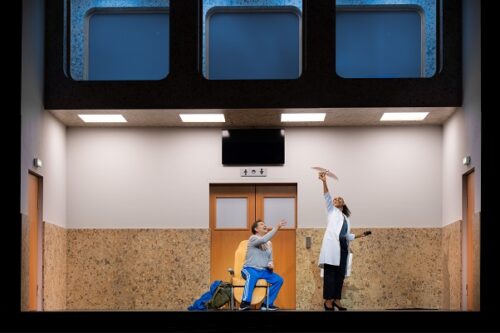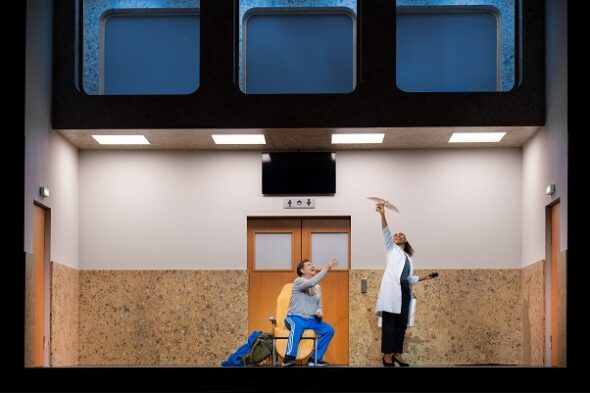 Germany Berlin Festtage [4] – Wagner, Siegfried: Soloists, Staatskapelle Berlin / Thomas Guggeis (conductor). Staatsoper Unter den Linden, Berlin, 8.4.2023. (MB)
Germany Berlin Festtage [4] – Wagner, Siegfried: Soloists, Staatskapelle Berlin / Thomas Guggeis (conductor). Staatsoper Unter den Linden, Berlin, 8.4.2023. (MB)

Production:
Director, Designs – Dmitri Tcherniakov
Costumes – Elena Zaytseva
Lighting – Gleb Filshtinsky
Video – Alexey Polubpoyarinov
Dramaturgy – Tatiana Werestchagina, Christoph Lang
Cast:
Siegfried – Andreas Schager
Mime – Stephan Rügamer
The Wanderer – Michael Volle
Alberich – Jochen Schmeckenbecher
Fafner – Peter Rose
Erda – Anna Kissjudit
Brünnhilde – Anja Kampe
Woodbird – Victoria Randem
Experiments resume, continue — and, in several respects, come into sharper focus. Film footage of a miserable, traumatised child whose play has gone wrong accompanies the first Prelude to Siegfried. Siegfried, his emotional growth stunted at least in part deliberately by Mime, presents himself. He is still a child, really, as the toys in the corner of Mime’s house suggest. He does not know his parents, fear, and quite a few other things; the research centre, which is at least in part to say Wagner, will later put him through a series of experiments in order to teach him fear: a dubious project, one might say, as celebrated scientists – Darwin, Humboldt, Mendel, et al. – look down or gaze impassively. Nothing or everything to do with them? The choice may be yours.
A Woodbird in lab coat, paper-bird experimental aid to hand, forms part of Siegfried’s education and further exploitation. An aged Wotan sporadically watches; such, after all, is the Wanderer’s way, though he has been doing this, courtesy of one-way mirrors, since the first scene of Die Walküre. Brünnhilde and Siegfried disconcertingly laugh at their task, yet when we consider how emotionally – and physically – abused both of them have been, is their infantilism remotely surprising? Whatever future awaits them in Götterdämmerung, it is unlikely to be bright. Norns, typically unflustered, continue to do their business, whatever it may be. Maybe we shall find out next time.
At least until the third act, Dmitri Tcherniakov and/or his cast’s commitment to detailed characterisation continues to impress. The third act, not entirely unlike the final scene of Die Walküre, flickers more intermittently with scenic inspiration; exploration-cum-confrontations such as those of Brünnhilde with Wotan and Siegfried respectively, seem not entirely to be Tcherniakov’s thing. By the same token, the reunion of Wotan and Alberich, like cantankerous foes in an old people’s home, is richly observed and increasingly sharply differentiated. There is more than a hint of Beckett, though that may come – it hardly matters – directly from Michael Volle and Jochen Schmeckenbecher, the former expanding on his unforgettable Bayreuth interactions with Johannes Martin Kränzle as Hans Sachs and Beckmesser. Both artists here stand at the very top of their game, words, music, and gesture combining to offer a masterclass in what Wagner demands theoretically in Opera and Drama and practically as both a man of the theatre and a supreme musical dramatist.

Andreas Schager’s Siegfried, by now quite a well-known quantity, remains an astonishing, tireless tour de force. It is easy to forget how, not so many years ago, we despaired of ever hearing someone capable of singing roles such as Siegfried and Tristan. A series of catastrophes at Covent Garden, for instance, all but derailed performances; Bayreuth seemed little better. Not only can Schager sing the role, he can act too — and did, entering with enthusiasm into Tcherniakov’s world, just as he had as Parsifal in the director’s production for this same house (review click here). Boundless energy is, of course, just the thing for the young Siegfried in particular; that and more are what he received. Anja Kampe’s Brünnhilde picked up where she left off last time and duly impressed. Coming cold to that final scene is a difficult thing to ask, yet one would never have known. I hope Tcherniakov will give them both more to attend to dramatically next time.
The rest of the cast was excellent too. Stephan Rügamer’s Mime led us skilfully through the misery of what it is to be Mime, yet also the malice and misery that cannot only be attributed to external misfortune. Peter Rose made a stronger impression as Fafner than he perhaps had in Das Rheingold. Anna Kissjudit’s Erda, though not given much to do in terms of theatre – perhaps I am still hankering after Frank Castorf’s unforgettable portrayal of her (Al)exanderplatz farewell – was beautifully sung once more. Victoria Randem gave a lively, ideally projected performance of the Woodbird, highly convincing in the unusual requests made of her by this particular production.
Perhaps the greatest star of all remains the astonishing Staatskapelle Berlin. The orchestra never put a foot wrong, responding with just as much skill and enthusiasm for Thomas Guggeis as they would have done for Daniel Barenboim. (I know I should stop mentioning him, but…) It leads and comments on the action as few can, and frankly cannot be bettered by any orchestra in this repertoire today. Guggeis’s work is similarly astonishing, when one considers it. For one so young, with so little rehearsal time, to take over a Ring and get through it in one piece would be no mean achievement. Yet he has done far more than that, bringing much that is different from either Barenboim or Christian Thielemann (earlier this season) without ever imposing himself upon the score or the action. The musical action flows as if it were the most natural thing in the world; maybe it is, but it does not just ‘happen’. And there are intriguing signs of how Guggeis’s interpretation may develop: a steely, wind-led harshness that at times recalls the Wagner (and Beethoven) of Karajan, especially apt in this ‘scherzo’ of the Ring, will balance heady, Romantic, yet always firmly directed outpourings of great emotional intelligence. Wagner, one might say, continues to provoke and experiment upon us all.
Mark Berry
